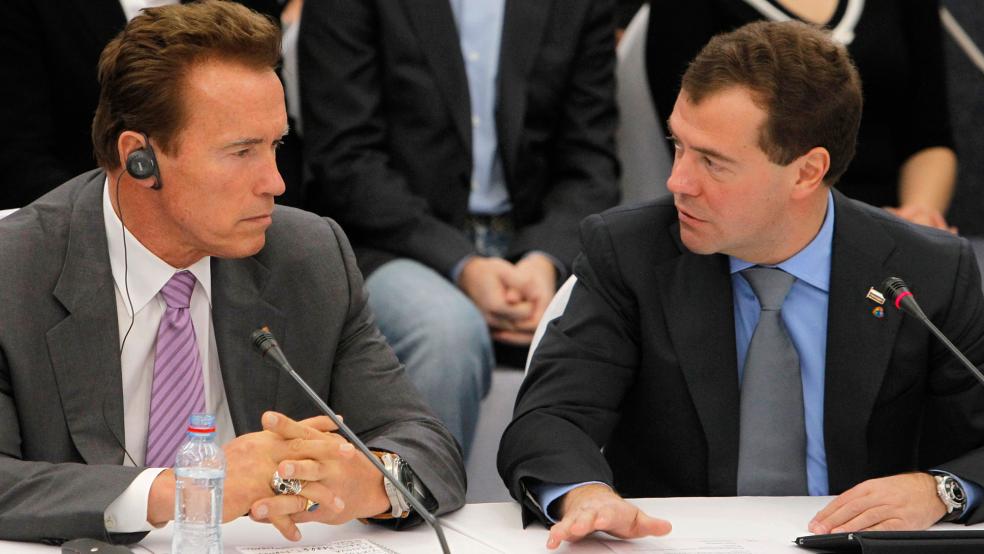Russian President Vladimir Putin is star-struck.
He has the American action star Steven Seagal talking up Moscow’s Crimean policies. He extended Russian citizenship to the French movie icon Gérard Depardieu, who now owns a vineyard in Crimea. He basks in the ways that Russia’s cultural and artistic cognoscenti are supporting Moscow’s aggression in Ukraine.
This offers the United States an unexpected opening. If Washington really wants to wield more influence over Putin, President Barack Obama need only place one call: to former California Governor Arnold Schwarzenegger. Give “The Governator” a sequel as the next U.S. ambassador to Russia.
Compare Schwarzenegger to Washington’s most recent ambassador, Michael McFaul. A Stanford political science professor, McFaul tended to follow his academic interests — focusing on building a civil society — which rubbed the Kremlin the wrong way and often hampered diplomatic efforts. Even John Tefft, a career diplomat and the former U.S. ambassador to Lithuania, Georgia and Ukraine who may be getting the Moscow post, is too well-known for his tough anti-Russian stance. He is unlikely to improve Washington’s relations with the Kremlin.
But consider: Schwarzenegger, who has serious political credentials as the two-term governor of California, is also the action hero of The Terminator, Terminator II: Judgment Day and Total Recall. He is a celebrated bodybuilder, five-time winner of the Mr. Universe competition. He has a larger-than-life personality, yet played a tough-but-kind nanny in Kindergarten Cop and an endearing man-mother in Junior.
Related: The Growing Power of Putin’s Propaganda Machine
Schwarzenegger personifies all the qualities that the Russian president most admires: He could teach Putin how to be everyone’s policeman and everyone’s nurse — at the same time. And since the Russian president is an avid martial arts enthusiast, the star of Collateral Damage andCommando could probably offer a few pointers.
In addition, Putin speaks German, having mastered it during his KGB posting as a Soviet spymaster in East Germany. So the Russian president can talk sports or East-West politics — or even women’s issues, since both he and Schwarzenegger have had past difficulties with marital fidelity — with the Austrian-born physical-fitness advocate in his native language.
I am not being frivolous — just pragmatic. I saw Putin courting cultural figures in his early Kremlin days. In the fall of 1999, we both attended a concert to hear the famous Georgian romance singer Nani Bregvadze, who was performing at a home in the chic section of Moscow. Putin was then an aspiring prime minister to President Boris Yeltsin and clearly intent on paying respects to influential members of the artistic intelligentsia. When this short man with opaque gray eyes, wearing a pitch-black suit, walked in, however, the elite had no interest in him.
Putin quickly sized up the cognoscenti’s disparaging mood. In a stunning move, he fell to his knees and crawled toward Bregvadze, begging her to sing. “You are my favorite artist of all time,” he insisted. The snooty Moscow intellectuals were smitten.
His adoration of Bregvadze garnered positive buzz around the capital. “Even if he is KGB,” the intellectual elite asserted, “he understands us, he loves culture.”
I knew then and there that with such prominent supporters, Putin’s victory as the successor to Yeltsin was sealed.
In 2003, I again watched Putin as he wooed Russia’s influential cultural elite. He was seated across the aisle from me at a concert in the new House of Music, off Moscow’s central Garden Ring. Putin was sandwiched between two iconic Russian artists. On one side was the celebrated former dissident, conductor-cellist Mstislav Rostropovich. On Putin’s other side was Rostropovich’s equally legendary wife, the opera soprano Galina Vishnevskaya.
Putin looked thrilled to be surrounded by these cultural giants — former Soviet exiles no less. He must have felt all-powerful in being able to merge the past and the future — the once irreconcilable differences between communism and its critics. Hanging out with famous artists was, for Putin, a validation of his personal magnitude.
Relying on cultural influences is, of course, one of the oldest tricks in any autocrat’s playbook. History has demonstrated this, particularly in Russia.
Tsarina Catherine the Great sought the enlightened friendship of the French writer and philosopher Voltaire as justification for her efforts to strengthen and expand the Russian empire. More than a century and a half later, the Soviet leader Joseph Stalin enlisted world-renowned artists like Boris Pasternak, the poet who wrote Dr. Zhivago, and Dmitri Shostakovich, the composer and pianist, to write odes and sing praises to the dictator and his rule.
Related: How Obama’s Russia Strategy Imperils Eastern Europe
Nikita Khrushchev, Stalin’s successor (and my great-grandfather), staked his de-Stalinization reform on the novels of Aleksandr Solzhenitsyn, whose 1962 One Day in the Life of Ivan Denisovich described the grim realities of the Soviet detention camps.
It was the ultimate post-Soviet irony that Putin, who launched his political career after serving as a KGB colonel, later embraced Solzhenitsyn, the fierce critic of the secret police, as a prophet of Slavic superiority. Though this time it was less about solving the existential problems of dictatorial rule and more about a photo-op with a cultural icon.
Given Putin’s long quest for celebrity approval, the Obama administration’s nomination of Schwarzenegger could offer the Russian leader a photo-op he can’t refuse. For Washington, the choice could be a better long-term strategy than exercising largely ineffective ideological outrage — even if the White House seems to enjoy insulting Putin — or costly economic sanctions.
Though a new Ukrainian president, Petro Poroshenko, has been elected, the Ukrainian crisis is still continuing. If Russia decides on a third act of its expansion (parts of Georgia and Ukraine being the first two) — say, to take over a Transdnestria region in Moldova, in case that country turns toward the West — The Governator might just have enough muscle to put a stop to it.


